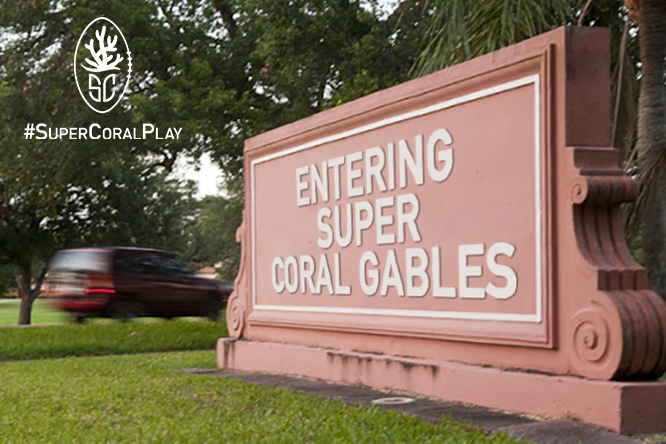The City of Coral Gables Challenges Cities to Make a “Super Coral Play” to Protect Coral Reefs
The City of Coral Gables is the first city in the United States to challenge other municipalities in South Florida to take action and make a #SuperCoralPlay by limiting their carbon footprint in order to protect and preserve coral reefs. The idea of having Coral Gables change its name, created by Newlink, could inspire other cities around the globe to take a more active role in global warming issues. From getting involved in a beach cleanup, to switching to LED bulbs, anyone can participate by making a pledge on social media and passing on the challenge by tagging 2 friends.
Having sponsored various sustainability-oriented initiatives in the past, Coral Gables Vice Mayor Vince Lago, championed the City’s participation in the #SuperCoralPlay campaign and proposed renaming the City as “Super Coral Gables” until the end of February 2020 in support of this environmental cause.
“The City of Coral Gables has been a leader when it comes to environmental stewardship. I’m so proud that today, we are a much greener city than we’ve ever been. During my time as an elected official, I’ve sponsored numerous pieces of legislation such as a Green Building Ordinance which requires buildings to meet LEED Silver or equivalent requirements and legislation that would waive permits for solar panel installations. We have the largest municipal fleet of fully electric vehicles in the state of Florida, which is environmentally sustainable and provides a benefit to our bottom line due to reduced maintenance and fossil fuel consumption. Not only is caring for the environment important, but it has a direct impact on our State and local economy due to our extensive waterways and coastlines, which attracts hundreds of thousands of visitors each year,” said Vice Mayor Vince Lago.
At the January 28th City Commission Meeting, Coral Gables leaders approved a Resolution sponsored by Commissioner Patricia Keon, that ceases the use of fertilizers containing nitrogen or phosphorous by City crews or contractors in City owned and operated properties during the rainiest summer months, from June 1st through September 30th each year. This item was named as the City’s #SuperCoralPlay and a pocket resolution sponsored by Vice Mayor Lago was approved challenging residents to voluntarily cease the use of these fertilizers during the rainy season.
In addition, Vice Mayor Lago and the City of Super Coral Gables challenged the City of Miami and encouraged all residents to join the movement and make a #SuperCoralPlay of their own that will positively impact the environment. In support of this campaign, the exterior of Coral Gables City Hall will be illuminated at night in coral colors beginning on January 28th through the end of February.
The #SuperCoralPlay campaign was initiated by MSC Foundation – the private non-profit foundation established to lead, focus and advance MSC Group’s conservation and humanitarian commitments.
The City of Coral Gables is an eco-conscious community and a leader in environmental initiatives. It has the largest municipal fleet of electric vehicles (EV) in the State of Florida and offers EV charging stations for public use in their parking garages. To protect our local environment, Coral Gables prohibits the use of expanded polystyrene and of single-use plastic drinking straws and stirrers in City facilities and parks, by city vendors or contractors, and at events on City property requiring a permit. Coral Gables recently established a Green Business Certification Program on Earth Day 2019 to encourage businesses to use sustainable alternatives that protect the environment.
Coral reefs are among the most diverse ecosystems in the world and home to more than 25 percent of marine species. Coral serve as a food resource for half a billion people and protect coastal communities from storms and erosion. According to NOAA, some 84% of U.S. coral reefs are located within Florida alone where coral ecosystem-related spending has been estimated to generate over $6 billion in economic impact in the five South Florida counties via annual sales, income, and employment, supporting over 71,000 full- and part-time jobs. According to the UN’s Intergovernmental Panel on Climate Change, scientists predict that 70-90% of coral reefs are in danger of dying out within the next two decades (2030-2050).







